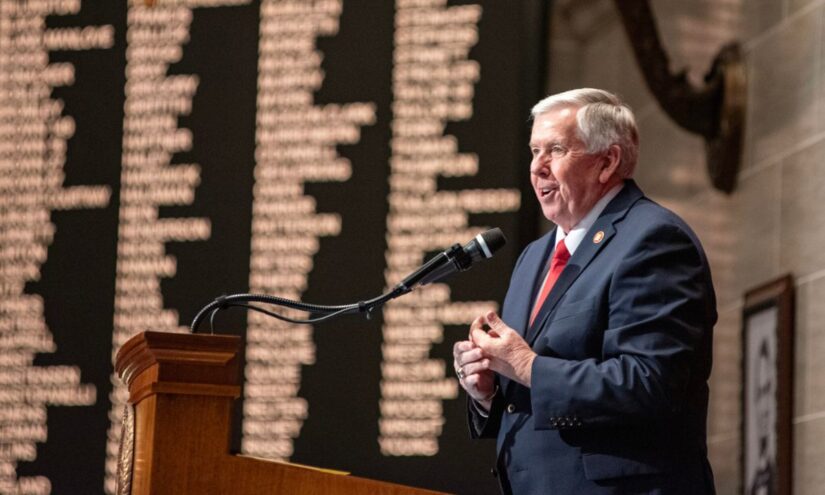During this summer, a team of students from MIT embarked on a journey to the sou …
Missouri Governor Approves Education Bill with $468M Funding for Teacher Pay Raises and Charter Schools
Emma Wordsmith

Missouri Governor Mike Parson approved legislation on Tuesday that increases the minimum salary for teachers, adjusts the public school funding formula, and enhances a tax-credit scholarship program for private schools.
The bill also permits charter schools in Boone County and mandates a public vote for districts considering a switch to a four-day school week.
Once fully implemented, the legislation is projected to carry an annual cost of approximately $468 million.
A day ahead of the constitutional deadline for action, Parson signed the bill without prior notice in his weekly schedule.
In a succinct statement, he highlighted the salary increase for teachers, which raises the minimum annual salary from $25,000 to $40,000.
“I have and always will be a supporter of Missouri teachers. Since the inception of our administration, we have explored avenues to raise teacher salaries and recognize the dedication of our educators for their strenuous work, and this legislation enables us to advance in that direction,” he remarked. “We hold high expectations for our educators in terms of educating and nurturing our children.”
CEO of the Quality Schools Coalition, Dean Johnson, emphasized investments in pre-k programs and teacher salaries in a press release following the bill signing.
“For years, Missouri education policies have remained static, lacking a commitment to reform and resources,” Johnson noted. “The legislation endorsed by Gov. Parson today strategically injects fresh investments in Missouri’s educational future, translating to better remuneration for teachers and well-equipped students.”
Among the few proponents of the legislation within the public education advocacy realm, Johnson emerged as a vocal supporter.
Expressing concerns about the prescribed increase in minimum teacher pay without assured funding, a collaborative composed of 41 school districts under the Southwest Center for Educational Excellence penned a letter to the Governor, initially disclosed by the Webb City Sentinel.
The districts voiced apprehensions that the annual minimum wage increment based on the consumer price index or inflation fails to ensure continuous state funding support.
“Implementing an annual increment in the minimum salary according to the consumer price index or inflation offers no guarantee of sustained state financing assistance,” remarked the school districts. “Our member districts unanimously support this provision, except for the missing assurances in the bill regarding future funding obligations.”
The Missouri School Boards’ Association drafted letters for school board representatives to dispatch to the Governor. Concerns were raised for districts compensating teachers below $40,000, highlighting fears of an unfunded statutory mandate.
“While there are clauses in this bill that enhance the statutory minimum teacher salary, the bill does not guarantee the appropriation of state funds for this year or subsequent years to support such an augmentation,” stated the sample letter. “Our district’s finances rely heavily on local taxes, and I am concerned that if the teacher salary enhancement competes with the foundation formula or school transportation funds, or remains unfunded, the board might be compelled to offset the difference through budget cuts or local tax raises.”
Representatives from seven Boone County school districts, excluding Centralia, penned a letter to Parson last Friday requesting a veto.
The legislation grants authority for the establishment of charter schools in the Boone County region. Except for designated areas such as Kansas City and St. Louis with unaccredited school districts, charter schools are currently permissible only under state statute. All existing Boone County districts are accredited.
“Our districts encompass varying student populations and local revenue streams,” the superintendents emphasized. “The introduction of a charter school and the diversion of state and local funding from our urban and rural districts could have detrimental repercussions on our operational sustainability.”
Questioning the legality of excluding Boone County from the scope, they argued against potential adverse outcomes.
The overarching opposition from public schools and affiliated entities centers on the expansion of the K-12 tax-credit scholarship program. Enacted, the law will extend the initiative statewide and broaden the income criteria from 200% of the free-and-reduced-lunch eligibility to 300%.
For a family of four, the income limit would stand at $166,500, in line with this school year’s reduced lunch criteria.
Initially conceived as a 12-page proposal to broaden the MOScholars tax-credit scholarship program, lobbyists representing public education bodies consistently testified against the legislation during the legislative session.
Senate Democrats orchestrated a filibuster to counter the legislation, leading to a compromise and a comprehensive 167-page education package.
The House refrained from altering the bill to avoid returning it to the Senate for renegotiation. Lawmakers made necessary adjustments by incorporating them into a separate House bill, clarifying exemptions like homeschools from the state law prohibiting firearms on school premises.
This resolution pacified the Missouri homeschool advocacy organization Families for Home Education, which switched its stance on the bill from opposition to neutrality. Numerous homeschooling families had initially requested exclusion from the tax-credit scholarship program to evade potential government oversight.


